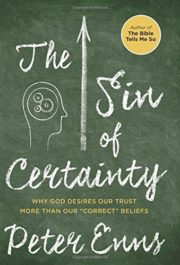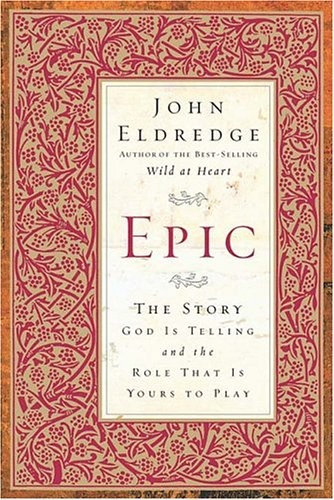The Sin of Certainty

After the Lord had spoken these words to Job, the Lord said to Eliphaz the Temanite: “My wrath is kindled against you and against your two friends; for you have not spoken of me what is right, as my servant Job has.
(Job 42)
God is describing Job’s know-it-all friends, who have presumed to explain why Job is suffering. The truth is, God has taken a dare in Heaven, but only the reader knows this. Job’s friends, who have blamed him for his suffering, don’t know; neither does Job. Though he asks God why and receives a famous response from God, this detail is left out. The story is therefore an example, among other things, of the ways we formulate not just our questions, but our answers, based on incomplete understanding and information when it comes to eternal matters.
It’s the mentality of Job’s friends that Peter Enns addresses in The Sin of Certainty: Why God Desires Our Trust More Than Our “Correct” Beliefs. This is the fourth of Peter Enns’s books that I’ve read. The first, Telling God’s Story, was my introduction to Enns. The second, The Evolution of Adam, has been till now my hands-down favorite. After that, I read The Bible Tells Me So, my least favorite. I’ve avoided The Sin of Certainty because with its provocative title, I thought it might descend into snark against fundamentalism. But it doesn’t. Not at all. In fact, it rises to a par with The Evolution of Adam as a valuable read, a reminder of the importance of questions and doubts in our spiritual journey. As its subtitle indicates, the book explores the difference between “‘correct’ beliefs” and “trust,” a distinction that preoccupation with being right and rational can blur — to our great loss.
Enns’s expertise (a PhD in Old Testament and a teaching post at Eastern University) makes his commentary on the Bible interesting without being overbearing. His sense of humor makes the book as entertaining as it is informative. His basic point is not new: the Bible, contrary to the way evangelicalism depicts it, is not a single unified book that tells us how to live and answers the questions our modern scientific age wants to ask. Rather, it is an ancient collection of voices that give a complex perspective on God, right living, and even history. Though Enns regards the Bible as inspired by God, it bears the marks of the human authors through whom his words come — their historical setting, their knowledge of nature and geography and science, their ideas of civilized society and leadership and a host of other things. From the first page to the last it presents a uniquely monotheistic, supremely creative God who is not identified with natural phenomena, but above it; who desires relationship with humans; who loves his creation enough to enter it in the Incarnation, enduring the worst of its suffering and injustice in order to redeem it. But beyond that, the writers of the Bible often don’t speak unanimously. Enns discusses some of the examples, focusing on aspects of God’s character in the Old Testament and Revelation, Job, the Psalms, and Ecclesiastes, to name a few.
Enns’s idea is that when we are preoccupied with defenses of the Bible’s rationality, inerrancy, scientific accuracy, or — worse — with the belief that we alone are “right” on this or that doctrinal issue, we miss out on what the Bible does have to offer us. That the first chapters of Genesis do not match what science suggests about the age of the earth is only a problem if that is the kind of information the Bible was designed to provide. What if it was meant to offer different, perhaps far richer, information about our faith? Those of us who read know that books do not have to be factually correct to be deeply instructive and nourishing in their glimpses of truth. If the world of imagination and vision were not of value, we wouldn’t have the prophets or the Psalms or the book of Job, for instance, in our book.
Enns discusses some of the historical influences that have shaped the tendency to regard the Bible as an inerrant historical record and a detailed instruction manual, then highlights some examples in the Bible that do not fit with this lens. In the remaining sections of the book, he offers a glimpse into his own spiritual journey, and the way it transformed his understanding of what it means to live out his Christian faith. Like many of us, Enns went through a time of seemingly crushing life experience that tested and refined his faith. Experiences like this break the autopilot feature of the comfortable Christian, and we discover that intellectual propositions and “answers” do not satisfy. Reading widely in this time, Enns discovered a body of mystical and contemplative literature and came to understand at a deeper level how knowing things about God, and trusting God, are quite different.
I think Peter Enns’s gift is providing a hearing for those who do not feel at home in the church of the certain. He has an understanding of the kinds of struggles people have with Christianity, whether as disillusioned Christians or as skeptics, and he is able to address their issues. As he writes, “I have. . . come to accept myself for what I am: I am wired as an explorer. I value challenging older orthodoxies and gaining new insights.”
The Sin of Certainty is probably a better book to give to someone wrestling with doubt or disillusionment than someone focused on defending a set of ideas. It meets such readers where they are. This is not to say that the content of our faith doesn’t matter, but as Enns points out, the object of our faith as Christians is not a “what”; it’s a “who.” The art of getting to know this personal God not bound by time and space follows a pattern that includes more than intellectual debate.



